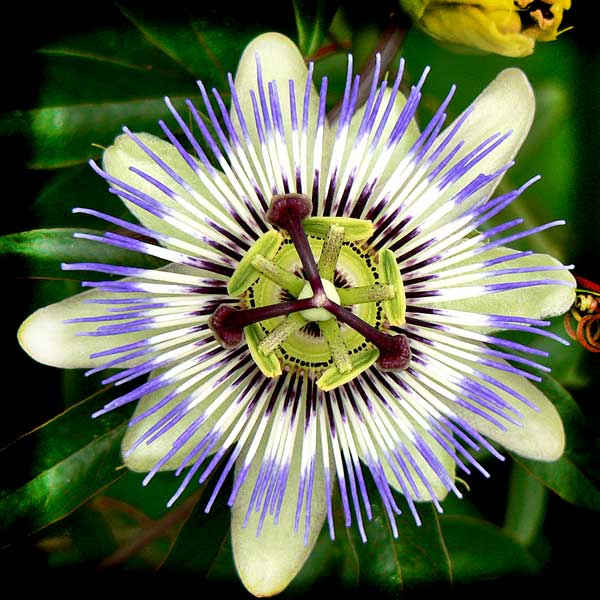
In this overwhelming and often stress-inducing world, there is little that is more healing than moments of precious tranquility. Stress has a profound impact on the body and mind, with studies showing it can lead to macroscopic changes in brain structure over time (Mariotti, A. 2015). This, in turn, can lead to other issues, such as a weakened immune system, difficulty in absorbing nutrients into the body properly, and a general decrease in quality of life. Amidst the whirlwind of life, there are centers of calm to be found—places where we can pause, reorient, and connect with Eirene, the Greek goddess and personification of peace.
Passionflower (passiflora icarnata) is one such herb that can aid us in finding these centers of calm. A commonly known nervine, used for promoting restful sleep, softening tension, and even easing occasional aches and pains. Native to Central and South America and now flourishing in many other areas of the world, its hypnotic blossoms invite us to slow down, find our footing, and welcome tranquility into our tired minds.
Soothing Frayed Edges
Picture this: After weeks of stress and frustration at work, the weight of accumulating responsibilities has pushed you to your limit. Your nerves are frayed, your shoulders ache from constant tension, and the edge of irritability has crept into your interactions. To top it all off, restful sleep feels like a distant memory.
This is the perfect time for an herbal intervention. For burnout characterized by overwhelm, irritability, and exhaustion, herbalist Kiva Rosethorn recommends a soothing blend of oatstraw (Avena sativa) and passionflower (Passiflora incarnata).

An effective option is Mountain Rose Herbs’ Tension Care formula, a carefully curated combination of linden, oats, skullcap, St. John’s wort, and passionflower. This tincture is designed to calm the nervous system and create a sense of internal balance. Taking this tincture directly on the tongue or diluted in a small amount of water can bring relief when used consistently over time, helping to ease both body and mind.
You can also take passionflower extract on its own, either directly on the tongue or mixed with tea. Similarly, passionflower is beneficial for individuals who struggle with circular thoughts or obsessive rumination over past events, helping to quiet the mind. By calming mental chatter, passionflower offers aid for achieving clarity and relaxation when struggling with mindfulness. I recommend a dose of passionflower before meditation to help with this very aspect.
Eirene’s Embrace Passionflower Bath
There’s nothing quite like sinking into a hot bath to melt away the stress of a long day. The soothing warmth of the water relaxes tense muscles and calms a busy mind, but you can elevate this experience further with the therapeutic benefits of herbs and Epsom salts.
Lavender, chamomile, and calendula bring their calming aromatics, while passionflower soothes frazzled nerves. Rose petals add a touch of luxury, reminding you to take time for self-care. Epsom salts round out the ritual by easing muscle tension and promoting further relaxation. This recipe makes enough for one bath, but you can always double the recipe if you’d like it to go further.
Ingredients
- 1 Tbsp. organic lavender flowers
- 2 Tbsps. organic chamomile flowers
- 2 Tbsps. organic calendula flowers
- 2 Tbsps. organic rose petals
- 1/4 cup organic passionflower
- 2 Tbsps.. organic rose petals for sprinkling over the bath (optional)
- 1 cup Epsom salts
Equipment
- Medium-sized pot
- Fine mesh strainer or cheesecloth
- Small bowl for mixing
- Large bowl for the infusion
- Spoon for mixing
Instructions
- Combine the lavender, chamomile, calendula, passionflower, and rose petals in a bowl.
- Bring 1 quart of water to a boil in a medium-sized pot.
- Once boiling, remove the pot from heat and add the herb mix to the water.
- Cover the pot and let the herbs steep for 20 minutes. This allows the beneficial compounds to infuse the water.
- Strain the infusion through a fine mesh strainer or cheesecloth into a large bowl, pressing the herbs with the back of a spoon to extract all the liquid. Discard the spent herbs or place the herbs inside a sachet and tie it for use in another bath.
- Fill your bathtub with comfortably warm water.
- Add Epsom salts to the bath while the water is still running.
- Pour the strained herbal infusion into the bath, stirring to disperse.
- (Optional) Sprinkle the reserved 2 tablespoons of rose petals directly onto the surface of the bathwater.
You can always play with proportions if you prefer a stronger or milder infusion. Start with this recipe as a guide and adjust it to your liking. If you have dried (or fresh) passionflower blossoms, you can also add a small handful to the bath to float in the water for the visual effect. I like to light a few candles and play some instrumental music when enjoying a bath like this to create the ultimate ambiance.
Resources
Mariotti, A. (2015). The effects of chronic stress on health: New insights into the molecular mechanisms of brain-body communication. Future Science OA, 1(3), FSO23. https://doi.org/10.4155/fso.15.21
Looking For More Herbal Bath Inspiration?
Sunshine & Moon Beam Bath Bomb Recipes
You may also enjoy:
Calming Meditation Tea Blend
Grounding Bath Bombs
Floral Bath Bombs
*These statements have not been evaluated by the Food and Drug Administration. These products are not intended to diagnose, treat, cure, or prevent any disease. We recommend that you consult with a qualified healthcare practitioner before using herbal products, particularly if you are pregnant, nursing, or on any medications. For educational purposes only.











